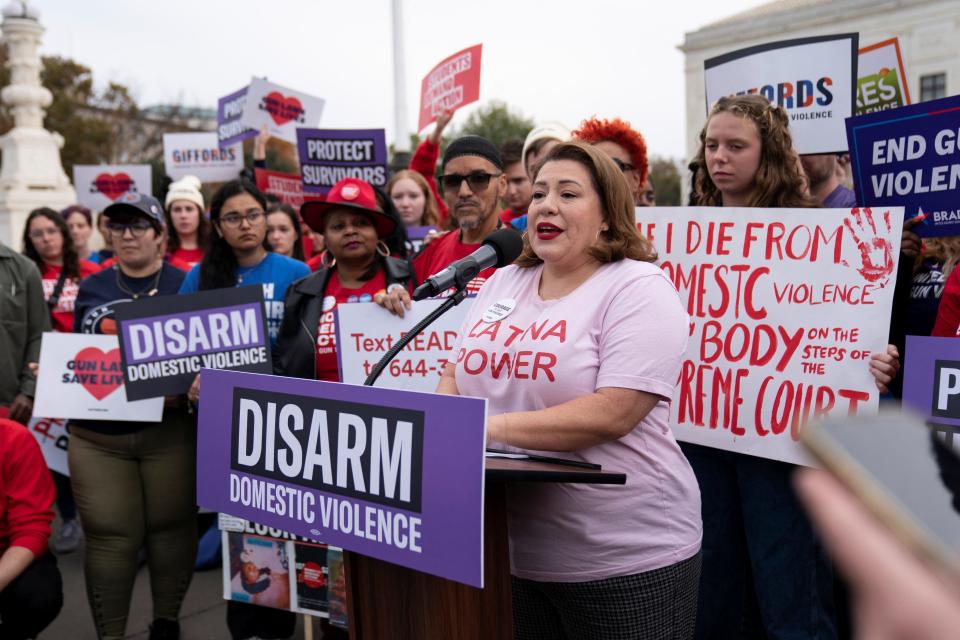Supreme Court orders another review of gun charge behind Hunter Biden's conviction
WASHINGTON – Hunter Biden's lawyer has vowed to appeal his conviction on gun charges, but the Supreme Court on Tuesday told another defendant challenging the same law as unconstitutional to have his case reviewed again by an appeals court.
Patrick Darnell Daniels Jr.’s case is part of a flood of Second Amendment challenges following a landmark Supreme Court decision in 2022. Daniels has challenged a federal law that bans gun possession for anyone who “is an unlawful user of or addicted to any controlled substance.”
The 5th U.S. Circuit Court of Appeals overturned his conviction and the Justice Department asked the Supreme Court to resolve the dispute. The justices told him to return to that court for a fresh decision based on a recent high court ruling that upheld disarming domestic abusers.
Hunter Biden, the president’s son, was convicted June 11 under the same law for lying on a federal screening form and to a gun dealer about his drug use while buying a revolver in October 2018. His sentencing hasn’t been scheduled, but his lawyer, Abbe Lowell, has vowed to appeal.

Why the flood of court cases about gun charges?
The uncertainty among federal courts about which gun laws are constitutional arose after the Supreme Court in 2022 struck down a New York law requiring state residents to have "proper cause" to carry a handgun. In New York State Rifle and Pistol Association v Bruen, the court said gun prohibitions must be grounded in history "consistent with our tradition of gun regulation."
Chief Justice John Roberts wrote in a recent decision that upheld gun restrictions against domestic abusers that some courts have misunderstood what the high court intended.
"Since the founding, our Nation’s firearm laws have included provisions preventing individuals who threaten physical harm to others from misusing firearms," Roberts wrote in that 8-1 decision.
Justice Ketanji Brown Jackson joined the majority but quibbled with analyzing statutes based on how they would have been viewed historically. She said a historical perspective on the Second Amendment would depend on the historians who are consulted.
“Who is protected by the Second Amendment, from a historical perspective?” Jackson wrote.

DOJ asks Supreme Court to review gun charges for violent, non-violent felons
After the high court provided some clarity in the domestic abuser case, the Justice Department asked the justices to decide in five cases other than Daniels’ if people convicted of violent and non-violent felonies can be barred from owning a firearm. The statute being tested was used in 7,600 federal convictions in 2022 that accounted for 12% of all federal criminal cases.
The challenges represented a variety of charges and circumstances. In one case, an Iowa man with a long criminal record of theft and assault with a deadly weapon is appealing his conviction for possessing a firearm as a felon.
Other crimes were non-violent. A Minnesota man who served time for selling cocaine said he shouldn’t have been charged for having a gun after completing his sentence. A Pennsylvania man argued his decades-old conviction for falsifying his income for food stamps shouldn’t prevent him from having a firearm. And a Utah woman said bad checks she wrote 17 years ago shouldn’t keep a pistol out of her hands.

Why is Daniels challenging the gun law?
Law enforcement officers pulled Daniels over in April 2022 for driving without a license plate. Officers, including one from the Drug Enforcement Administration, searched the car and found marijuana cigarette butts in the ashtray, along with a loaded pistol and loaded rifle.
Daniels admitted in an interview he smoked marijuana about 14 days per month. A U.S. District Court jury convicted him of possession of firearms while using drugs. He was sentenced to 46 months – nearly four years – in prison.
But under the Supreme Court’s decision in Bruen, the 5th Circuit overturned Daniels’ conviction “based on the historical record compiled by the parties.”
The appeals court ruled that “because there was little regulation of drugs” at the founding of the country, “intoxication via alcohol” was the “next-closest" comparison. While some jurisdictions in the 19th century had prohibited “carrying weapons while under the influence, none barred gun possession by regular drinkers.”
The appeals court concluded that history and tradition could at most support “a ban on gun possession while an individual is presently under the influence,” not a ban on gun possession based on “a pattern of drug use.”
Solicitor General Elizabeth Prelogar wrote that the ruling "was profoundly mistaken" in asking the Supreme Court to hear the case.

What happened in Biden's trial?
Biden acknowledged he was addicted to crack cocaine for four years. At his federal trial in Delaware, witnesses including his former wife and sister-in-law told harrowing stories about searching his belongings for drugs to protect his children.
Biden’s lawyer argued he had recently completed a rehab program and didn't intend to mislead anyone about his previous drug usage. But prosecutors revealed a text message from the day after he bought the gun saying he was waiting to meet a drug dealer, and one two days later where he said he was smoking crack.
Justice Department special counsel David Weiss said the case wasn’t about addiction but about “the illegal choices the defendant made while in the throes of addiction.”
Lowell, Biden’s lawyer, said he respected the jury’s verdict, but he would “continue to vigorously pursue all the legal challenges available to Hunter.”
This article originally appeared on USA TODAY: Supreme Court orders review of law behind Hunter Biden's gun conviction